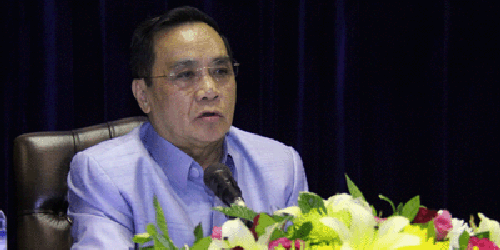PM Gets Tough On Financial Control
Prime Minister Thongsing Thammavong has told ministries and government agencies they must closely control all aspects of finance so Laos can pay its debts and avoid a financial crisis.
Mr Thongsing made the statement at the close of a national meeting in Vientiane on Friday to discuss the 2013-2014 socio-economic development plan.
The meeting was attended by ministers, deputy ministers, department directors, and personnel from government bodies and central and provincial institutions.
“In general, Laos is running a high level of debt and is at risk of a financial crisis. This means we should closely control all aspects of investment and sharpen our focus during the upcoming 2013-14 fiscal year,” Mr Thongsing said.
As reported at the last ordinary session of the National Assembly, the country’s debt stood at 29.8 percent of Gross Domestic Product.
To turn the situation around, Mr Thongsing said the government would delay paying monies owed to contractors carrying out its own projects. This would take the strain off the country’s financial and currency concerns. Meanwhile the finance sector should rigorously collect all sources of revenue owed to the government.
“The finance sector must make a concentrated effort to collect all revenue, so the amount collected is as close to the target as possible,” he said.
It is because revenue targets have not been met that salary payments to civil servants have been delayed, he explained.
Mr Thongsing gave instructions on new measures to prevent future debt, saying the Ministry of Finance should actively and stringently respect planning and finance principles, as well as the laws on State Investment and Budget.
“Any projects that have not been approved by the National Assembly, as well as those where the government owes money to private contractors, will not be allowed to continue,” he said.
“The operation of such projects and the disbursement of money for use by them will be viewed as a violation of administrative principles.”
It would be acceptable for these projects to obtain funding from sources other than the government, he said.
Mr Thongsing also requested that no new government projects be initiated in the 2013-14 fiscal year. This would include the construction of new offices and projects that do not directly contribute to productivity.
With regard to projects that were authorised before 2011 and whose contractors are owed money by the government, he advised ministries, agencies, organisations and local administrations to budget payments in their annual plans. However, the government will not consider payments to projects authorised after 2011.
While Mr Thongsing praised the success of some projects that had converted property into capital, he said they should be studied in depth to ensure their effectiveness and efficiency.
He ordered the ministries of Finance, and Planning and Investment to partner with related units in reviewing the practices and lessons learnt under these schemes.
He also instructed ministries and government agencies to avoid passing on state property to private companies so they could build offices in exchange, as this represented a loss for the government.
Source: Vientiane Times

